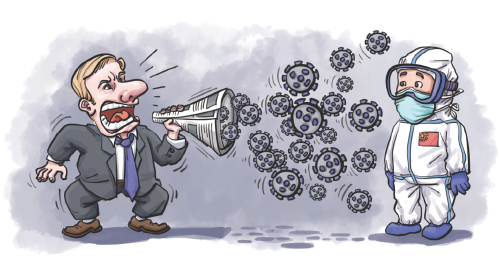Did the media lie the world into an Omicron wave?


The news media, it must be said, does not have the strongest sense of scientific literacy.
I doubt this will court a great deal of controversy. Experts in countless fields have vented their frustrations with how their research is misrepresented in the pages of the mainstream press. In the era of COVID-19 this has reached new heights, with all manner of false narratives amplified by even the most storied institutions: wild speculation about a Chinese "cover-up", selective reporting on vaccine efficacy despite reams of real-world data and the initial rejection then wholehearted embrace of a "lab leak" origin hypothesis, to name only a few.
Yet despite this wholly justified mistrust, many continue to look to the media as a reliable source of information — even the aforementioned experts, who turn to another section of the hypothetical newspaper and passively accept whatever's written there. Novelist Michael Crichton coined the term "Gell-Mann amnesia effect" to describe this phenomenon, but we can just call it what it is: Phony credibility "earned" by being the richest, oldest kids on the block.
This might not be as big a deal for some topics; I doubt anyone suffers too badly if someone on the entertainment beat, for instance, gets the facts wrong. Maybe a producer makes an angry phone call. But it's an entirely different story when it comes to matters of life and death.
To that end, a study which received preliminary release early this month may have quietly upended everything we've been told about the Omicron variant currently predominating. After careful analysis of figures from the Omicron wave at the start of this year, experts from Harvard Medical School and Massachusetts General Hospital have come to some troubling conclusions: "Our findings suggest…the Omicron variant was as deadly as the previous SARS-CoV-2 waves. The hospitalization risk had a less consistent pattern, but after accounting for confounders, Omicron seems to have a slightly higher hospitalization risk."
If this study proves to be accurate, then the media outlets that pushed "living with the virus" as a viable strategy led millions of people straight off a cliff.
Think back to January. The New York Times ran a high-profile column with the bold headline "Omicron Is Milder". The Wall Street Journal said "Omicron May End Up Saving Lives" in a similar vein. What followed was the biggest infection wave of the entire pandemic, where new records were set for daily infections, hospitalizations and deaths. Though it is a preprint and awaiting peer review, it should come as no surprise this study has been soundly ignored by those same outlets; giving it any attention would be tantamount to admitting guilt.
How many lives were lost because of this global swindle? How many were hoodwinked into thinking Omicron was the perfect pandemic off-ramp and thus threw caution to the winds? And how many chastised China for pursuing an aggressive containment strategy against a variant dismissed as "mild" in every "respectable" media outlet, only to pretend not to notice as more people than ever fell deathly ill?
A functioning society would not stand for this. There would be demands for justice, accountability and a sane pandemic policy based on science rather than the whims of corporations who wanted the economy revved back up at warp speed. Instead, the same media that spent those crucial months convincing the world Omicron was nothing to fear have turned to their old standby: Deflect, deflect, deflect.
Just as they did in the early months of the pandemic, they point the finger at one of the few places that has refused to submit to "let 'er rip" orthodoxy. In early 2020 Wuhan was the story; the proof China's measures were a "draconian" overreach. But as the virus swept the rest of the world and ICUs filled to bursting in countries that were supposedly "better at fighting outbreaks", as one poorly aged headline put it, it became all too clear that narrative would no longer fly.
As so many countries faltered, unwilling to take the bitter pill and put people over profits, there grew an urgent need to pass the buck. But by that time the worst of the outbreak in China had been contained, and life in Wuhan had largely gotten back to normal. Anyone with eyes could see those supposedly "authoritarian" measures had worked. Chastened, the media shifted tack, and thus began the running of other, aforementioned narratives.
Nearly two years later, enter Shanghai. As the outbreak there spiraled out of control, the old Wuhan playbook came back into fashion. In the last month and a half we've gotten the media's "Greatest Hits" album as they slipped back into their old habits with gusto, willfully ignoring the fact dozens of other cities handled their Omicron outbreaks with little incident. Whatever issues there were with Shanghai's outbreak response — and make no mistake, there were plenty — the country as a whole has proven time and time again it can do what it takes to protect its people.
All this to say the sheer weight of the media's deception does not depend on the results of a single study. If borne out, these findings only provide scientific proof for what was already abundantly clear: Ignorance of what this virus can do does nothing to prevent the consequences, and underestimation of its potential has never been anything but a grave error.
As if to drive this home, the US just this week crossed the grim threshold of one million cumulative deaths according to public data; the real count is unknowable, but likely far higher.
Rather than rage against a country trying to prevent that outcome for its own people, victimized populations should be demanding to know why those in charge have treated them as chattel for the sake of plutocrats' stock portfolios — and why a supposedly "free press" has aided and abetted it.
The author is a US writer with China Daily.
The views don't necessarily reflect those of China Daily. If you have a specific expertise, or would like to share your thought about our stories, then send us your writings at opinion@chinadaily.com.cn, and comment@chinadaily.com.cn.


































